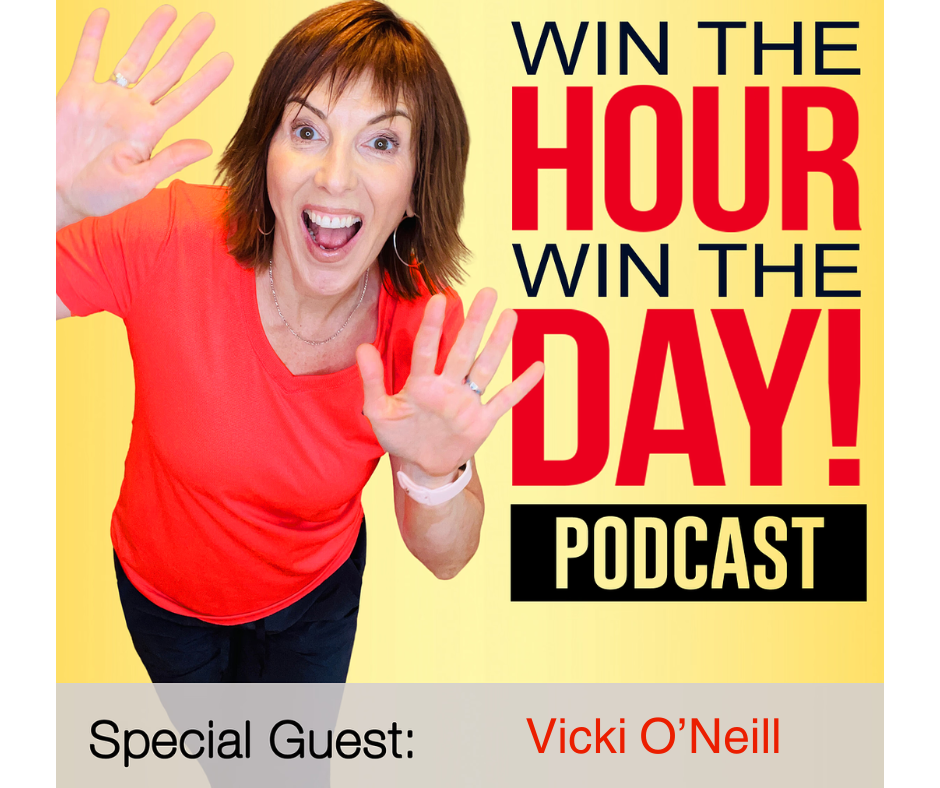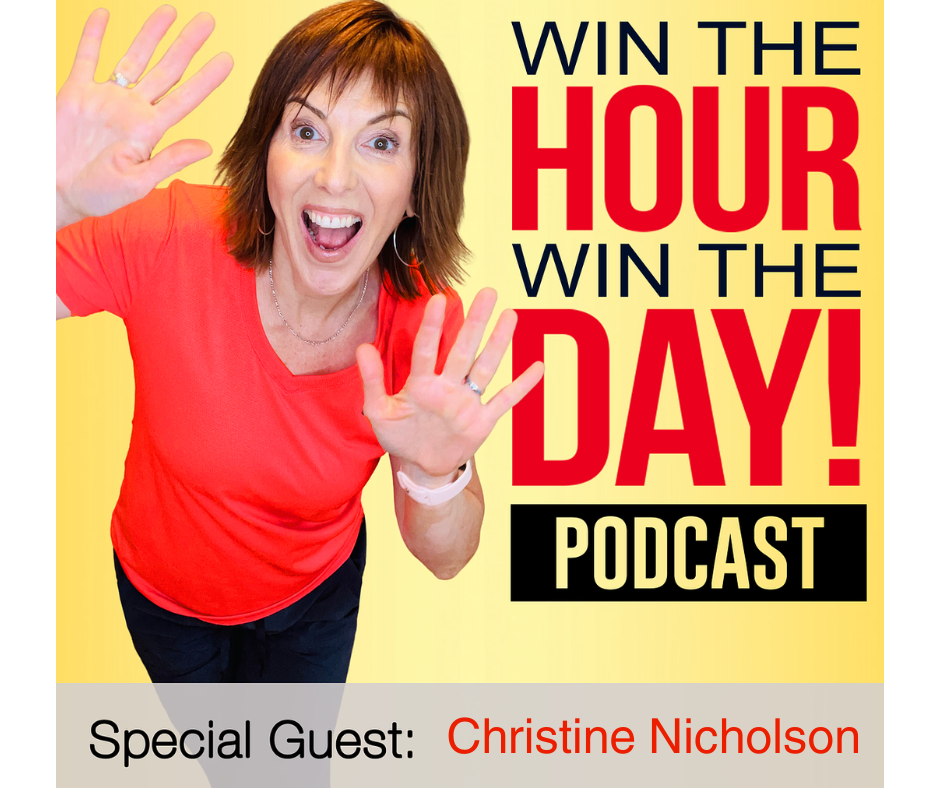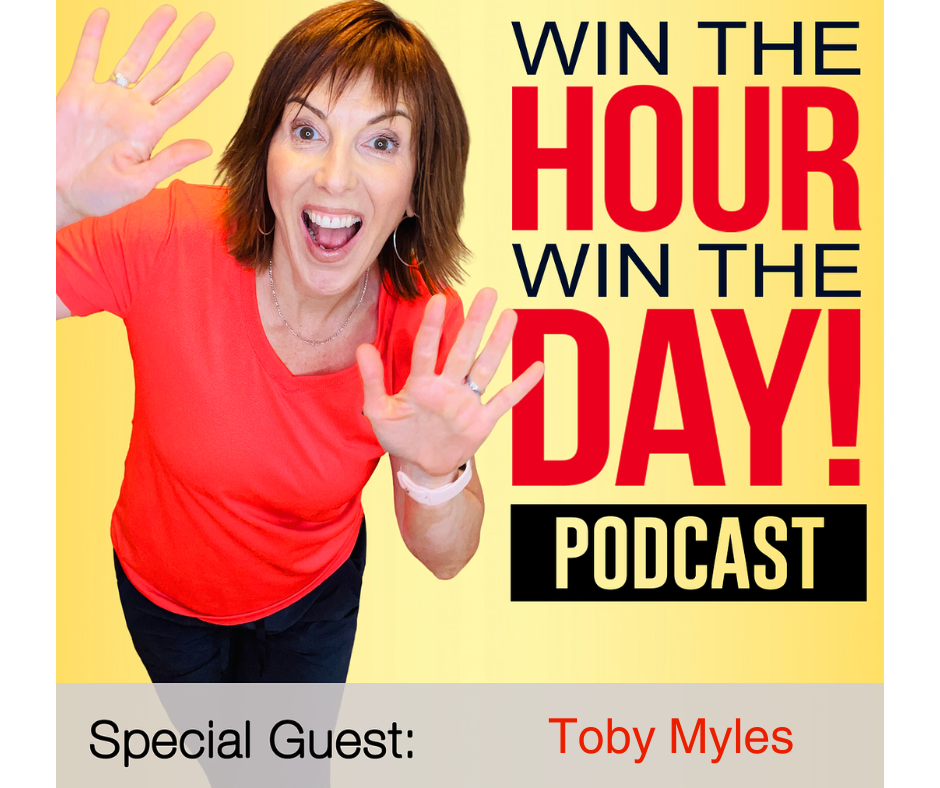Episode Summary
This week’s episode of Win The Hour, Win The Day Podcast is sponsored by Win The Hour, Win The Day’s Signature Coaching Program the Winners Circle. Kris Ward who helps entrepreneurs to stop working so hard interviews, Holly Fisher.
Craving for a brand that stands out?
In this riveting, we dived into the strategies of three iconic brands.
You’ll get insights on:
-How brands like Patagonia, Dove, and IKEA embody purpose-driven branding.
-The importance of keeping your brand’s core values amidst evolving market trends.
-The connection between brand authenticity and customer loyalty.
Prepare to rethink your branding strategies and uncover the secrets of successful brands.
Don’t miss this chance to redefine your brand’s potential!
WIN Back Time Quiz
http://winbacktimequiz.com/
Win The Hour, Win The Day! www.winthehourwintheday.com
Podcast: Win The Hour, Win The Day Podcast
Facebook: https://www.facebook.com/winthehourwintheday/
LinkedIn: https://www.linkedin.com/company/win-the-hour-win-the-day-podcast
Win The Hour, Win The Day Winners Circle: https://winthehourwintheday.com/winners-circle-masterclass
You can find Holly Fisher at:
Website: https://fisher-creative.com/
Facebook: https://www.facebook.com/FisherCreativeMarketing
Instagram: https://www.instagram.com/fishercreativemarketing/
YouTube: https://www.youtube.com/channel/UC0eADoUXHXgICTV_QlW0HFA
Win The Hour Win The Day
https://winthehourwintheday.com
Holly Fisher Podcast Transcription
[00:00:00] Kris Ward: Hey, everyone. Welcome to another episode of Win The Hour Win The Day and I am your host, Kris Ward. And today in the house, we have Holly Fisher and she is a marketing copy writer. And we’re going to dive into a bunch of things and ways that we can save you money and make sure that, you’re rolling out the path, the most effective you can when you start talking about marketing, copywriting, what that looks like, even just say for your website. Welcome to the show, Holly.
[00:00:26] Holly Fisher: Yeah. Thanks for having me. Happy to be here.
[00:00:29] Kris Ward: Thanks. Okay. So when we chatted before, you and I, one of the things that we talked about, and this is my pet peeve, and I see this happen all the time, whether you’re new in business or you’ve been in business a while, you can easily get seduced into, Oh, I need to update my website.
[00:00:44] Or I you get shiny object syndrome. You see somebody else’s website and you think, Oh, they’re doing really well, or their website looks really fancy. And so we have to change ours. But… what is so important? And I think we really need to be reminded of this because I often say I forgot I knew that is that, you’re not looking, I don’t know, I’m like a plant.
[00:01:05] You’re not looking at the roots, you’re just looking at the flower, right? And you don’t know what’s going on, how long they’ve been in business, all this stuff that they have in the back end, the SEO, whatever. So it’s really easy to get you know, glossy eyed and say, I need a new website, but you bring up some really valuable points that I think are very salient on the fact that, listen, more than anything, before you go spending money on a pretty website with all the buttons and the whistles, it’s really about the copy on that website. That is the engine in the car.
[00:01:36] Holly Fisher: 100%. Yes, I’ve definitely had people come to me before and they’ve been working on their website and they’re like, okay, we have the design. We have everything ready. Did you help us with the content? And I’m like, oh, no, we’ve, you’ve done this in the complete wrong order. So you’re right. We really have to start with the messaging and the content and then we can get to all the pretty things, right? The colors and the fonts and..
[00:02:06] Kris Ward: Okay. Like when I wrote my book or when we do this in grade school, everybody’s done that where I don’t know if this just tells you what a bad student I was, or if everybody’s done this at one point, listen, you don’t need the cover page right now. You haven’t written the essay, right?
[00:02:22] And we know that. And that’s the same thing with my book. When I wrote my book, it’s all about the content, editing it and doing all this stuff. And who cares about the chapters or the pictures or anything? And none of that mattered. And yet we know that or we lecture our children about that when they’re in school but you forget that when it’s your website.
[00:02:40] Holly Fisher: Yes, absolutely. You’re right. You wouldn’t sit down and be like, I’m going to write a book and then start by designing the cover. Yeah. You’re going to do the content 1st and really get that nailed and then start worrying about the aesthetics. Yeah. How it looks and the appearance. And so exactly the same thing with your website.
[00:02:57] You have to start by making sure you know exactly what you’re saying, right? What is that brand message? How are you speaking into the problem? You solve for customers and clients getting that nailed down and then starting on the rest of the website design.
[00:03:12] Kris Ward: Okay, so I know you’re a fan and you follow also the story brand by Donald Miller, which is well respected.
[00:03:18] And so he talks about the seven elements of of the story brand, the character, the problem, stepping into the guide role plan, calling them to action, success and the failure of what’s at stake if they don’t. So even if I just think for me. You know what, you hear this and you go yeah. Like I think I’ve heard this before.
[00:03:39] I read the book. I’ve had other people on the show, but I feel like I could be reminded of this on Thursdays. Like you go, all right, I got to write some copy or, oh, I have to tell something to my audience or whatever you’re doing. And then you keep forgetting, oh, I should tell a story, and then just even remembering to tell a story is one thing.
[00:03:59] Diving into the framework of that story and the path you choose is another. So why don’t we go through this and you remind us of things that you feel people tend to forget or overlook and that they’re, really missing out when they do that.
[00:04:13] Holly Fisher: Yeah, absolutely. Yes. I’ve been, StoryBrand certified guide for a number of years. And so when I work with clients, that’s the first thing we do, right? We walk through this framework and we make sure we have the messaging clear, because then that is going to set the foundation for the other things that you’re working on. So you’re not sitting down to write content and going, I’m wondering what I should say, right?
[00:04:33] We’ve already figured that out. So just go back to this framework and what we’ve in the brand message that we’ve created, and you can continue to pull from that. So So the big thing is, number one your character in the story, right? Your customer, your client, what is that thing that they want? What do they want?
[00:04:52] Do they want a new website? Do they want to have more time in their day? What is that thing that they want? I tell people..
[00:05:00] Kris Ward: So let me jump in here, because I think one of the bigger mistakes that people tend to make is thinking perhaps, and you know better than me, because it’s what you do, is that I’m the character. No, the client is the characters. Okay. Yeah. So my client who has often been in business at least five 10 years, what they’re doing is working way too many hours for where they are at this point in their journey. And they’re now what I think is starting to blame their character flaws of, “Oh, I should not be working as many hours at this point.”
[00:05:29] So maybe I’m not organized, maybe I’m not disciplined maybe. So they’re doing all that because they can’t figure anything else out because they’re quite smart and capable and organized. So then they think, “Oh, it must, it still must be me.” So that would be my character’s flaws. Would that something that I can lean into?
[00:05:45] Holly Fisher: Yeah. Yeah. What’s the thing that they’re wanting?
[00:05:47] They want to work less. It could be as simple as that. I just don’t want to work 80 hours a week. Or I want to be more organized with my day so that I’m more productive and I don’t have to work so many hours. So thinking about that thing that they want, maybe the thing that they’re sitting down and typing into a Google search, right? What is that thing that the character wants?
[00:06:07] Kris Ward: And yeah, absolutely.
[00:06:08] Holly Fisher: The character is your customer or your client, right? We are inviting them into this story. It is all about them. So they’re the character in this. So once we figure out the thing that they want, we have to look at the problem. What’s keeping them from getting what they want. What’s getting in the way.
[00:06:28] Kris Ward: So the problem isn’t that they’re working too many hours. The problem is why are they working too many hours? Okay.
[00:06:34] Holly Fisher: What’s the problem, right? What’s the problem there?
[00:06:37] Kris Ward: So for me, let me just, I will use as an example cause I think it helps us navigate this conversation.
[00:06:42] So for me, often the problem is… they either have no team, no outsourcers, they think that they can’t afford it, or they might have somebody and they’re not utilizing it because they don’t have any systems and processes in play. They think their business is different. They think because they have a creative element to their job that they can’t use their calendar effectively, those types of things. So those would be some of the problems they face.
[00:07:04] Holly Fisher: Absolutely. It could very well be that, yes they don’t have any help. They’re trying to do everything themselves, right? They don’t want to work 80 hours, but they feel like they don’t have any choice because they don’t have anyone to help them.
[00:07:16] Thinking about, okay, what is that problem? And then we also want to think about how that problem is making them feel. It’s very important for us to tap into that emotional element as well, or we refer to it as the internal problem. Are they feeling exhausted, burned out, frustrated, probably overwhelmed all of the different what’s the emotion that folks are feeling because they’re working too much. They don’t have a team to help them.
[00:07:47] Kris Ward: Okay. Fabulous. Okay. And then we step into the guide role. So what does that look like?
[00:07:52] Holly Fisher: We actually want to solve one more problem. Okay. We actually want to solve a philosophical problem as well, which is why is it wrong that your customers and clients are even dealing with this in the first place?
[00:08:04] So you may think about it as the why behind your business, right? Why do you want to help people win back their time? So from deserve to, because they deserve to have a business that they’re enjoying.
[00:08:18] Kris Ward: Yeah. Yeah. Cause you couldn’t just say that job you hate it. I always say I, your business should support your life instead of consuming it.
[00:08:25] Yeah. And it’s you hear somebody that’s just starting a business and sometimes they’ll say it’s cause I don’t want to be traveling and, driving into the city and I want to spend more time with my family. You feel like good luck to that. Okay. Shoot. I remember being up when I started my business one night at two o’clock in the morning and I remember thinking there are labor laws in the land to protect me.
[00:08:44] If you were working for somebody else on the news, like you cannot do this in this day and age. And there I was doing it to myself. So yeah. So why do I want to do that? Honestly, in my case, a lot of my clients tell me very generously that they think I either changed their life or saved their life because they were just so struggling with burnout. It was just very discouraging. So that’s into the problem as well. The why?
[00:09:09] Holly Fisher: Yeah. Yeah. Okay. Thinking about the… that problem that. They’re working so much, right? They don’t want to work so much. And they are working so much because they don’t have any health. And so they’re feeling completely burned out and you’re stepping in going, you deserve to have a business that supports you not running your life.
[00:09:28] And then that’s at the point where your potential customers and clients are starting to go up, starting to go. Yeah. That’s you are describing me, and that’s what we want. We want them to read that on your website or in your social media posts or whatnot and think she gets me.
[00:09:48] She is speaking my language. And we’ve all experienced that with the business, right? Where we’ve read something and thought, oh, my gosh, were they in my office?
[00:09:56] Kris Ward: Now, when you’re doing these seven elements here, I understand on the website, that’s one thing. But if I was writing a small blog or a post, do I try to cover all seven elements of this in that post? Or sometimes I will, and sometimes I highlight one aspect of it. Is there different ways to dice this up?
[00:10:14] Holly Fisher: Yeah, absolutely. Yeah, you could certainly, cherry pick some things for a blog post, right? Or a social media. Maybe you go, I’m just going to talk about the success that people are going to experience when they work with me.
[00:10:27] I’m just going to highlight that in this LinkedIn post that I’m working on. I’m going to do another 1 that really talks about, the problem, or maybe it just talks about the philosophical problem. Here’s why I believe what I believe about my business. Absolutely, you can slice and dice these and put them together in different ways that makes sense.
[00:10:45] Kris Ward: Okay, perfect. So then we talk about stepping into the guide role.
[00:10:49] Holly Fisher: Yeah. So this is actually really important, right? A lot of businesses want to spend a lot of time talking about themselves, right? And making sure that we know all of the great things that you’ve done as a business, or, you want to have just all of the highlights and accolades and I started this business and we’re telling our whole life story before we’ve gotten to, before we’ve talked about that problem we’re solving for people. And so we want to make sure that we’re stepping into the guide role so that our customers can really be the heroes here. We want them to have a successful outcome.
[00:11:22] And to do that, we need to be their trusted guide. And so the way that we do that is by simply expressing some empathy with their problem. Okay. “Hey, I used to work 80 hours a week. I know how tough that can be, right? I know how frustrating, frustrating it is to miss your kid’s soccer game because you’re having to work, right?”
[00:11:45] It’s just a little bit of empathy so that people know, okay, this person understands what I’m going through.
[00:11:52] Kris Ward: And then, so in that guide role, it’s, it could be a number of things, so it’s not necessarily how I’m going to get you from A to B, which I think we’d all might confuse that, but just the fact that I am your guide, like a Sherpa taking you up the mountain.
[00:12:07] It’s you need to know I’ve been up the mountain a couple of times. If you’re looking to go up the mountain, I’m your gal. So the guide role doesn’t have to necessarily be how I’m going to get you there, but just educating you that I am the guide you’re looking for.
[00:12:21] Holly Fisher: Yeah. In the empathy piece, for sure. We want to just express that we understand how people are feeling and then we can offer up what we call the authority as another element of the guide role. And so that is where you can say, you know what, I’ve got a process, a plan, a path, a way forward to help you. And again, at this point, we don’t have to get into all of the details, but it’s enough to say, “Hey, I understand how you’re struggling. And I have a solution. I have this system. I have this framework. I have this Group coaching program, like whatever it is, right?” You have a way to help them solve their problem. And then also, it’s important to remember that, we can drip in things like testimonials or, maybe if you’ve been interviewed on podcasts or featured in the media or things like that, you can drip in a few of those things to just add to that authority piece.
[00:13:19] Kris Ward: Okay. That sounds good. Yeah. And then we go to the plan.
[00:13:23] Holly Fisher: Yes, so we always want to give people a really easy way to move forward with us, right? People are typically going to have some hesitations to doing business with you, right? It could be a cost or a time commitment or whatever. So we just want to give them usually 3 steps, 3 really simple steps forward, right?
[00:13:43] And that might start with booking a consultation call. Could be step one, step two could potentially be choosing one of my three packages and then step three might be working only 40 hours a week. And so it’s very simple. It’s not meant to cover every step in your process. We don’t have to give people all the things.
[00:14:08] Kris Ward: So we can talk to them about the plan of working with us. Here are some options to start engagement with us. If the plan isn’t necessarily. Here’s what we do and how we do it. And I’m going to over stimulate you with education on here’s what we do. So the plan is the plan for us to move forward versus how we’re going to implement the change.
[00:14:28] Holly Fisher: That’s right. Yeah. And I think that makes it so easy for people to look at and go, okay this doesn’t feel so hard. I can at least book the discovery call. That’s what we want people to do is just take that first step, then it’s up to you to get them on the phone or, whatever. And so that is that’s process plan is just really a simple way for people to go. Okay. Okay. I was feeling a little overwhelmed about hiring this person, but I think I can take this 1st step.
[00:14:58] Kris Ward: Gotcha. All right. That makes sense. Yeah. And so that leads us into calling them to action.
[00:15:02] Holly Fisher: Yeah, so we have to tell people where we want them to go, what we want them to do. If you think about any kind of a movie that you’ve watched an action movie, right?
[00:15:11] There’s that sort of pivotal moment where it’s like, all right, somebody’s got to disarm this bomb, right? We got to do that. We got to stop the speeding bus. We have to disarm the bomb whatever the thing is. And so that’s what we’re doing in our story is we’re calling our heroes to action. We’re asking them to do something right to book a demo, sign up for a program, schedule a consultation.
[00:15:33] Kris Ward: How is that different than the plan though?
[00:15:36] Holly Fisher: Sometimes they’re the same and sometimes they’re different. Okay. All right. So sometimes the first step of the plan might be the same as the call to action.
[00:15:44] Sometimes it can be different. Okay. So it depends on the business there. Lots of times they are the same thing.
[00:15:50] Kris Ward: Okay. That makes sense. All right. And then the success.
[00:15:54] Holly Fisher: Yeah, so here’s all the success that people are going to experience after they do business with you, right? What are the results? And so you can probably make a list of 10 things, right?
[00:16:04] That people are going to experience after doing business with you, right? They’re not having to work as much. They have more time with their kids. Maybe they can take better care of their health. They can exercise. They can spend more time with their spouse or whatever, right? Like they’re just, their business is probably operating better.
[00:16:21] Cause they’re not exhausted, burned out, right? They’re making more money, like all the things you can create a nice long list of the success elements. Yeah.
[00:16:31] Kris Ward: And so should we be using this sort of always having this at our fingertips of when we go? I know you said earlier you don’t have to use all aspects of it.
[00:16:39] You can highlight some focus on others, but whether we do that or not, should this be the starting point when we go to communicate anything, whether it be a blog or broadcast or anything and say, hey, Okay. Am I going to touch on all seven? Am I going to emphasize one, but we should always be starting here when we’re producing any kind of content.
[00:17:01] Holly Fisher: Absolutely. Yes. This really becomes the foundational message. This is how you talk about your business. And we want our marketing message to be consistent, right? Really marketing is an exercise in memorization. So if we, sometimes it feels to us like we’re saying the same things over and over again, but that’s good, right?
[00:17:21] Because we want people to associate our business with solving this particular problem. And if we talk about it differently every time they’re going to be confused. Oh, one time she said she did this, right? Other times she said this.
[00:17:35] Kris Ward: So you do feel that you feel like when you’re out there, you’re like, Oh my God, I don’t anymore.
[00:17:40] But in the beginning I think, Oh, I’m supposed to, even when I went on podcasts, I think, Oh, I’m supposed to give a different story because I told that story last week. It’s like at a family event and I think I’m repeating myself, but nobody gets tired of listening to McDonald’s talk about big Macs, like it’s, they been doing that now.
[00:17:56] I don’t know how many years and it’s over and over and over again. Let us not be forgotten. We serve Big Macs, right? But when you’re out there, you’re like, and I think if anything to your point that you can tell the same stories over and over again, but I don’t know if you’ve ever watched a documentary where you see comedians get their tight 10, they have to have a tight 10 to be on stage.
[00:18:15] And they’re always crafting, if I say this joke, is it better to say a dog or golden retriever? What’s funnier, right? So they’re always tweaking the message to make their 10 minutes even tighter. And so I think that’s the thing too, is you may feel like you’re repeating yourself, but you are improving every time you stay, say it.
[00:18:33] The short story is getting, I have a cold people. So I lost the gift of speech, right? The story is getting shorter and more effective. And the responses you get from people or the questions, then you can tweak it a little bit more. So even if it’s the same thing, you’re improving it.
[00:18:48] Holly Fisher: That’s right. Yeah, absolutely. Absolutely. And then people are very clear about what it is that you do, because you’ve been saying the same thing. You’re right. We don’t have to wonder does McDonald’s still do Big Macs? I don’t know. Like we
[00:19:00] know that’s what you do. So same thing for your business. You want people to know exactly what you do.
[00:19:07] Kris Ward: And then the failure of what’s at stake if they don’t do it, and that’s different than the problem.
[00:19:13] Holly Fisher: Yeah. So we actually want to just tap into a little bit of how is their problem going to maybe worsen? What are the failure elements, right? So they’re going to keep working 80 hours a week.
[00:19:26] They’re not going to get to spend any time with their kids. Maybe their marriage is suffering. Maybe the business starts to suffer. Clients are unhappy because you don’t, your work, your work quality might not be as good because you’re just stretched too thin. So you, again, you can list several things and we don’t have to overkill on this, right?
[00:19:44] We’re not trying to do like a big scare tactic here, but we do want to just poke at that a little bit, sprinkle that into our messaging and remind people like, okay, you cannot work with me, but here are the consequences.
[00:19:57] Kris Ward: Yeah. I was talking to somebody the other day that wanted to join the Winners Circle and her kids were like eight and 10 or something like that.
[00:20:03] And two, three years more in a business. That is the blink of an eye, but taking that 12 year old to 15, you have moments left where they give a crap about you. Obviously, I have a cold. I never swear on this, but anyhow, you have very few moments left. Where they think that you’re the best, like those are fleeting moments, right?
[00:20:26] So that’s the thing is you want to get on this right away because by the time you sort yourself out in another three years, and that’s not a long time in a business, these people are like looking at the back of your head with their friends in the back seat. Don’t even want to talk to you. Just drive me somewhere, right?
[00:20:40] Holly Fisher: That’s right. And so that’s a perfect example of the failure. What’s at stake, right? If I don’t take care of this and get my business situated and get my schedule in order, I’m missing some real pivotal time with my kids and my family.
[00:20:55] Kris Ward: Yeah. In that case too, it’s really interesting. I’ve had a number of people that came to work with us and that had incredibly serious accidents from being sleep deprived or also I call myself a recovering rushaholic, you’re rushing and you have accidents. And one just happened recently, but I hate talking about it because I think it’s horribly violent, but she was rushing and she spilled a whole pot of tea on her and she had to hop into the shower and pull her clothes off because her skin was bubbly.
[00:21:20] And she said, I was just so tired, Kris, and I’m just rushing. Like I know what I did that. And I get those things all the time. So it really does get dangerous when you’re going full tilt all the time, exhausted. Oh my gosh. Okay. So this is the framework that you do when you’re working with content for the website or any kind of messaging that you’re putting out there. You want to be keeping this in mind and going through it.
[00:21:44] Holly Fisher: Absolutely. And even if you’re developing like a new service line or a new product, you can go through this exercise. With that, too, or if you have a couple of different kinds of clients, maybe they have slightly different problems. And so you need to target some messaging to 1 or some messaging to the other, for example, or I said, you’re developing a new product.
[00:22:07] And so you’re like, okay, we need to have a slightly different message for that. Cause we’re creating a whole landing page just for X, Y, Z.
[00:22:15] Kris Ward: Yeah, that’s a really good point. Cause you tend to put it all in one bucket. This is what I do and this is who I do it for. So let’s say I was now building a product specifically for people that were new in business, the answers to these questions would be different than the clients that I traditionally deal with who have been in business at least five years.
[00:22:32] So it’s not all one in the same. And so going through this would make you aware of the subtleties and the differences.
[00:22:40] Holly Fisher: Yes, absolutely. You can create one sort of umbrella message for your brand. And then if you do need to splinter off and have some sub messages for specific products or audiences or things like that, it really is super helpful.
[00:22:55] Kris Ward: That’s wonderful. Okay. As we wrap up here, what’s one more thing that you think people miss the boat on constantly when it comes to this type of thing?
[00:23:03] Holly Fisher: I think it’s just like we talked about earlier coming back to this, right? Don’t just don’t work on this. And then, like it gets lost under a pile of, papers on your desk or something, right?
[00:23:14] Continue to come back to this, continue to repeat the message, continue to talk about the problem you solve for people. If I say, I have a headache, you’re going to offer me an aspirin, right? Or because, that’s the solution for a headache. You’re not going to offer me a tones.
[00:23:30] Right? And so you want to make sure that again, your business is known for solving a very specific problem so that people, when they have that problem, they’re coming to you. And so coming back to this messaging, making sure that it’s really clear before you work on anything else is really important.
[00:23:50] Kris Ward: And I think not thinking that it’s done something recently. I’m, I don’t, I’m ashamed to say that took me this long to figure it out, but something that I find is okay, look, we’re, we check our website and I think, oh, I need to make some changes because we now got whatever we’re doing this in the Winners Circle.
[00:24:05] So let’s add some more things. And then what I realized recently is that looks all well and good. My Google doc, when I’m writing it out, it sounds really good. And then I see it on the page. I’m like, oh, that’s a bit too much copy, or I veered off there or whatever. And so it’s easy to look at something, go, okay, great.
[00:24:20] I’m done. I’m done. I, oh, I hate writing copy. I got my, I updated the website. I’m done. And so now what we’ve started doing is we revisit our website every Thursday because every time I find something, it’s like, “Oh, we could say this better or what?” And this is the storefront to the world. And so many of us, we get it done because we need it done.
[00:24:42] And then we’re never coming in that front door. We never see that storefront ever. And it could be down, unless somebody tells us, that’s right. Yes. I think your messaging here, revisiting it is a powerful one because it’s so easy to go. Okay, there’s that done. I got something else to do, but this is everything.
[00:25:01] Cause this is how you communicate to people who don’t know you or just met you or whatever it’s that constant improvement of tightening the effectiveness of your message.
[00:25:11] Holly Fisher: I often remind clients to we just need to get this out into the world. And as you said, come back and adjust as needed.
[00:25:18] I had a client recently that we had done all of this work and did the messaging and the website. And then after several months or maybe even a year or so, he was like, I’m finding that here are some words that are resonating a little bit better. So let’s make some updates. I was like, fantastic. Let’s make some updates to the messaging and the website and just tweak that a little bit, because sometimes you get things out there and then you find, oh, actually, I should say, maybe this way, just a little bit differently. This is landing better with people. Yeah, and you always a work in progress.
[00:25:48] Kris Ward: And you can’t edit what’s not out there. So you have to get feedback, right? So fantastic. Okay. Holly, this has been fantastic. Where can people find more of your brilliance?
[00:25:57] Holly Fisher: Yeah. So best place is my website, which is fisher-creative. com. Fisher dash creative. com. And that’s where, and then you can find me Fisher Creative Marketing on all the socials, YouTube, Facebook, Instagram, all the places.
[00:26:13] Kris Ward: Okay. That is fantastic. Everyone else. We’ll see you in the next episode. Again, make sure to share this show with just one business buddy. It will make a difference for them and it will just get them moving further faster. So we’ll see you in the next episode.










